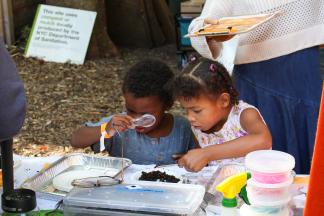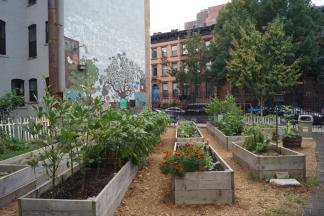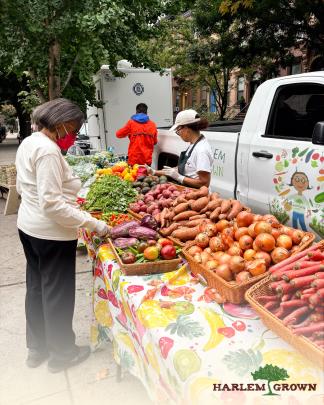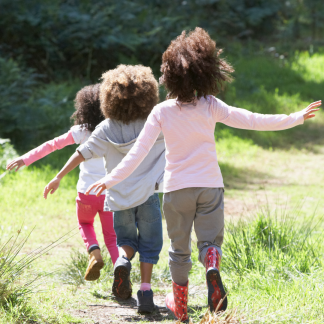Member Spotlight
Harlem Grown

In the heart of Harlem, a movement to use urban farms as living classrooms has been growing for over a decade. Harlem Grown started from one idea and now includes a network of community gardens, farm stands, community events, school partnerships, after-school programs, a summer camp, and more.
We met Harlem Grown's founder, Tony Hillery, at the 2024 Nature-Based Early Learning Conference's inaugural meeting of the Natural Start Alliance's Black Educators Network. The meeting brought together Black leaders in nature-based early childhood education to envision how a professional network can draw more Black educators to the field, and support Black families in nature-based education. Harlem Grown participated in the meeting, sharing what they have learned about sustaining a thriving community in all its cultural richness through connections to nature. Their story is so inspiring that we asked Tony to tell us more about Harlem Grown’s approach, captured in his responses to our questions below.

Can you give us a little bit of background about how Harlem Grown got started?
Harlem Grown started when I volunteered at a local Harlem elementary school, where he directly observed the insufficient resources allocated to schools and the inadequate nutritional support for students. While volunteering, I caught sight of an abandoned community garden across the street and envisioned an opportunity for positive change, marking the beginning of Harlem Grown’s first-ever growing season. I worked alongside 400 students to plant 400 seedlings, witnessing their development of healthier, sustainable eating habits and valuable life skills among the youth. The initial season yielded 38 pounds of produce setting the stage for a remarkable journey.
For people who aren't familiar with New York City, can you describe what makes Harlem special?
Harlem is more than just a neighborhood—it’s a cultural epicenter, historically and presently. Harlem has been a beacon of Black excellence, creativity, and resilience for generations, shaping the country’s music, art, literature, and civil rights movements. From the Harlem Renaissance to the jazz clubs and soul food traditions, Harlem is a living testament to the power of community and cultural expression.

At Harlem Grown, we take pride in contributing to this legacy. Our work on the farms and in schools honors Harlem’s deep sense of community and empowerment by nurturing the next generation of changemakers. Through hands-on education and sustainable urban agriculture, we are helping to cultivate a healthy, vibrant community—building on Harlem’s rich tradition of fostering creativity, solidarity, and collective growth.
We talk a lot about culturally responsive education, or education that reflects and responds to the cultural identities and unique interests of the children and families in programs. How does Harlem Grown provide education that's responsive to the Harlem community and the cultural backgrounds of the people who live there?
Harlem Grown celebrates the diverse cultures represented in the Harlem community through our educational programs, seasonal celebrations, and through our cooking workshops. The focus of this work is to affirm the young people we work with and to provide the representation that is critical to them seeing themselves as leaders, innovators, and creatives. Whether it’s an after-school workshop on crops native to different parts of the world, learning about people of color who made significant scientific contributions to agriculture, learning to make healthy dishes from cultures around the world, or having a Juneteenth Celebration on our farm, Harlem Grown uses every opportunity to celebrate the rich cultural legacy of our children and families. Community members contribute to our programs by volunteering to teach our children to prepare dishes from their native countries.

Why do you think urban farms make great classrooms?
Urban farms make great classrooms because they offer our youth hands-on, experiential learning that goes far beyond traditional education. At Harlem Grown, our farms serve as living classrooms where children from urban settings are introduced to sustainable growing practices and taught in a culturally responsive way that connects deeply with their lives. By engaging in farm-based education, they gain a sense of belonging within an environmentally conscious community, learning that their contributions to sustainability matter.
Our Summer Camp, for example, is a free, seven-week program that gives over 50 children the opportunity to grow their own food from seed to harvest. They get to experience the entire process of cultivating nutritious ingredients and then use them in cooking demonstrations with our Chef, reinforcing the connection between food, culture, and health. These experiences not only teach practical skills but also provide a sense of agency. When students are in our green spaces, they feel safe, empowered, and free to explore. It’s not about how much produce we yield; it’s about how much our youth grow through these experiences.
Additionally, in many Black and Brown neighborhoods, green spaces are limited, congested, or underfunded. Research has shown that access to open spaces is tied to improved physical and mental health. By providing green spaces here in Harlem, we’re offering more than just a chance to learn how to grow food—we’re creating social and cultural connections that counter environmental racial injustice, while fostering physical and emotional well-being in our community.
In addition to community gardens, Harlem Grown also offers a wide range of programs including school programs, summer camp, community programs, and more. How has the organization been able to offer such a wide range of programs?

At Harlem Grown, our youth and families drive our mission. In low-income communities like Harlem, access to high-quality programs and fresh, healthy food can be limited. To address this, we offer all our programs—school, summer camp, community programs, and more—completely free and accessible. Our programming directly responds to the needs of our community, and as those needs evolve, so do our offerings.
Harlem Grown’s growth lies in the ongoing engagement of local educators, students, and community members, who play a crucial role in advising and shaping our initiatives as we work to enrich the community we serve. For example, our Independent After School Program was created in response to feedback from parents and school partners who identified a need for out-of-school programming. This year-round, five-day-a-week program is just one way we continue to expand and enhance our services.
We maintain our wide range of programs by engaging with community stakeholders and strategically planning our fundraising efforts. By diversifying revenue streams and strengthening our development infrastructure, we ensure our financial stability and long-term growth, allowing us to continue building programs that meet the needs of Harlem’s youth.
What advice would you give to people who feel inspired by Harlem Grown?
Our advice for people feeling inspired by our work is to remember that one person can’t do everything, but everyone can do something. At Harlem Grown, building relationships with other organizations is key to our success. Our partnerships allow us to have a lasting impact on our community, and we believe our model can extend beyond Harlem. While we are deeply committed to continuing our work here, the model behind Harlem Grown can be emulated in other communities as well.
Doing your part could mean setting up a farm stand, revitalizing a green space, or most importantly, supporting youth in becoming empowered, healthy, and successful adults. This could take the form of mentorship, offering internships, or hosting workshops—anything that helps invest in the next generation. Every action, no matter how small, contributes to a healthier, more sustainable community.



